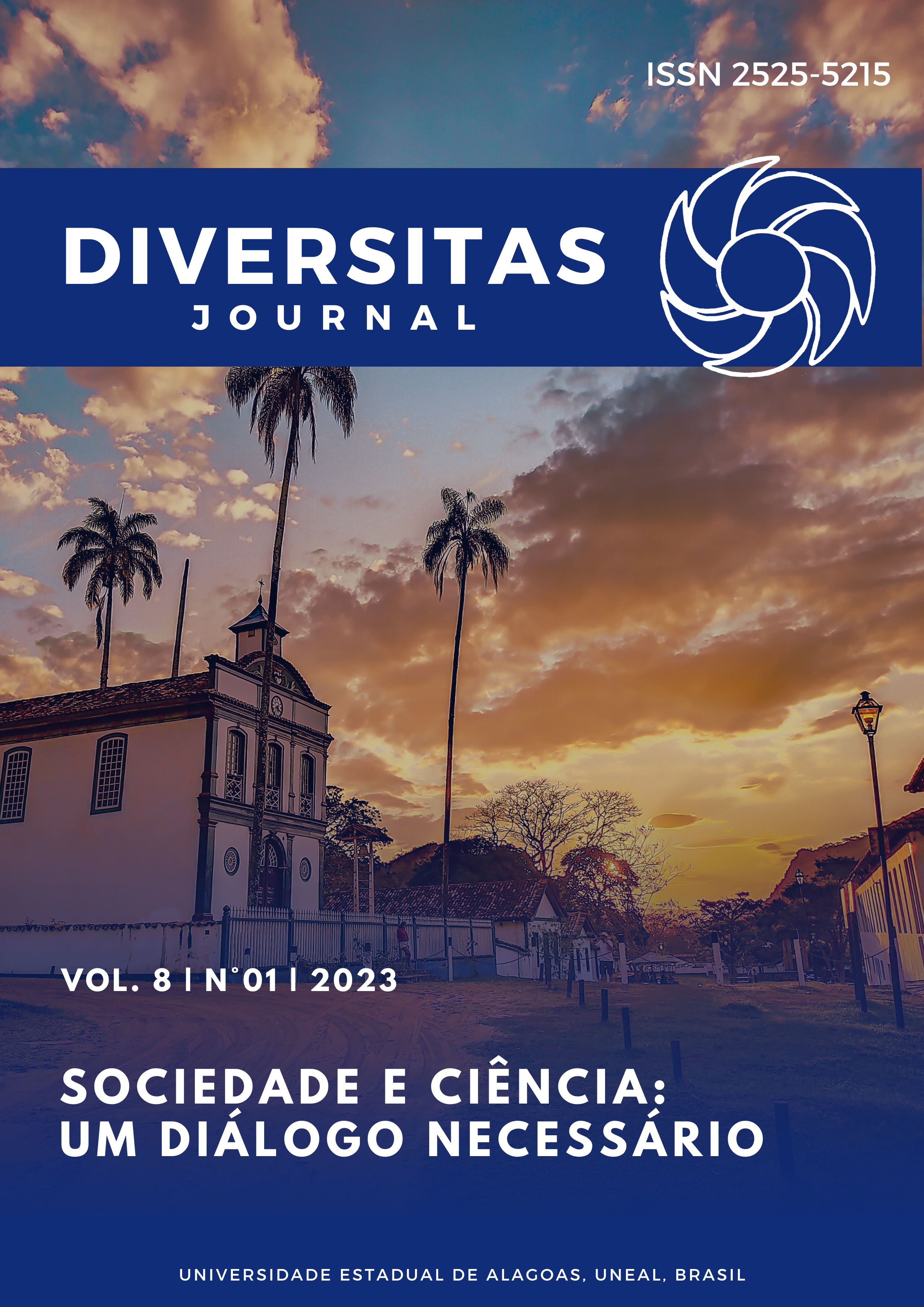Linguistic relativism and universalism
some considerations on language and thought
DOI:
https://doi.org/10.48017/dj.v8i1.2403Keywords:
Linguistic relativism, linguistic universalism, language, thought, human societyAbstract
Language establishes itself as one of the oldest branches - since Ancient Greece - of systematic investigation. Thus, it is important to emphasize that language is a frequent object of academic analysis in both the social sciences and the exact sciences, but without a consensual understanding of its "nature". The debate focuses mainly on how language emerges in the species and its relation to human thought. So, we analyze two of the main currents of thought that have undertaken linguistic studies with respect to this issue, such as 1. The school of linguistic relativity; and 2. The school of linguistic universalism. For this purpose, it was fundamental to conduct a bibliographic research - in journals, theses and books - which allowed us to grasp the theoretical approach of both schools. Thereby, throughout this article, we seek to understand the different approaches to the relationship between language and thought, in such a way that we conduct a general analysis of relativism and then address linguistic universalism. Therefore, the debate about language and its relation with thought is establishes as one of the most relevant elements in the history of human society.
Metrics
References
CAMPOS, Jorge (2011). Chomsky vs Pinker: na interface entre linguística e psicologia evolucionária. Letras de Hoje, Porto Alegre, v. 46, n. 3, p. 12-17.
https://revistaseletronicas.pucrs.br/ojs/index.php/fale/article/view/9739
CHOMSKY, Noam (1998). Linguagem e mente: pensamentos atuais sobre antigos problemas. Brasília: Editora Universidade de Brasília.
______ (1980). Reflexões sobre a linguagem. São Paulo: Cultrix.
CIZESCKI, Fernanda (2008). Entre Chomsky e Port-Royal: uma análise da leitura chomskiana. Work. Pap. Liguíst., v. 9, n. 1, p. 121-131.
https://doi.org/10.5007/1984-8420.2008v9n1p121
GALEGO; Ángel J.; CHOMSKY, Noam (2020). A faculdade da linguagem: um objeto biológico, uma janela para a mente e uma ponte entre disciplinas. Revista Linguística, Rio de Janeiro, v. 16, número especial comemorativo, p. 52-84.
https://doi.org/10.31513/linguistica.2020.v16nEsp.a39404
GIPPER, Helmut (1979). Is there a linguistic relativity principle? On the verification of the Sapir-Whorf hypotesis. Indiana, v. 5, n. 1, p. 1-14.
https://doi.org/10.18441/ind.v5i0.1-14
GONÇALVES, Rodrigo Tadeu (2008). Perpétua prisão órfica ou Ênio tinha três corações: o relativismo lingüístico e o aspecto criativo da linguagem. Tese (Doutorado em Letras) – Universidade Federal do Paraná, Curitiba.
HAUSER, Marc D.; CHOMSKY, Noam; FITCH, W. Tecumseh (2002). The faculty of language: what is it, who has it, and how did it evolve? Science, v. 298, p. 1569-1579.
https://doi.org/10.1126/science.298.5598.1569
LIMA, Lucas Francelino de (2020). Relativismo linguístico: a relação entre língua e pensamento na conceitualização do tempo. Monografia (Graduação em Letras – Língua Inglesa) – Centro de Ciências Humanas, Letras e Artes, Universidade Federal da Paraíba, João Pessoa.
MACHADO, Isadora (2015). A reinvenção da “hipótese Sapir-Whorf”. Línguas e Instrumentos Linguísticos, n. 35, p. 29-52.
http://www.revistalinguas.com/edicao35/artigo2.pdf
MARQUES, Veruska Paioli do Nascimento (2014). Relativismo linguístico revisitado: como categorias numéricas podem influenciar a representação do mundo. Dissertação (Mestrado em Antropologia) – Escola de Ciências Sociais e Humanas, Instituto Universitário de Lisboa, Lisboa.
PINKER, Steven (2002). O instinto da linguagem: como a mente cria a linguagem. Tradução de Claudia Berliner; revisão técnica Cynthia Levart Zooca. São Paulo: Martins Fontes.
ROBL, Affonso (1975). Língua e “recorte” da realidade: uma abordagem da relação língua – cultura. Letras, Curitiba, v. 24, p. 3-20.
https://revistas.ufpr.br/letras/article/download/19582/12797
RODRÍGUEZ, Alfredo Maceira (1998). Universalismo e relativismo lingüístico. Revista Philologus, Rio de Janeiro, v. 11, p. 27-37.
http://www.filologia.org.br/revista/11/02.pdf
ROJAS, Letícia Rodrigues; GOMES, Nataniel dos Santos Gomes (2017). O relativismo linguístico no conto “A história de sua vida”, de Ted Chiang (Textos Completos). In: Anais do XXI Congresso Nacional de Linguística e Filologia, Rio de Janeiro, v. 21, n. 3, p. 2195-2213.
http://www.filologia.org.br/xxi_cnlf/cnlf/tomo2/0163.pdf
SAMPAIO, Rebecca Demicheli (2018). Linguagem, cognição e cultura: a hipótese Sapir-Whorf. Cadernos do IL, Porto Alegre, n. 56, p. 229-240.
https://doi.org/10.22456/2236-6385.83356
SAPIR, Edward ([1921] 1994). El lenguaje: introducción al estúdio del habla. México: Fondo de Cultura Económica.
______. The status of linguistics as a Science. Language, v. 5, n. 4, p. 207-214, 1929.
https://doi.org/10.2307/409588
SAUSSURE, Ferdinand de ([1996] 2006). Curso de lingüística geral. São Paulo: Cultrix.
STEINER, George (1972). Whorf, Chomsky and the student of literature. New Literary History, Autumn, v. 4, n. 1, p. 15-34.
https://doi.org/10.2307/468489
WHORF, Benjamin Lee (1956). Language, thought and reality: selected writings of Benjamin Lee Whorf. Edit. John B. Carrol. Cambridge, MA: The MIT Press.
YOO, Christopher S. (2021). What is the relationship between language and thought?: Linguistic Relativity and its Implications for Copyright. Faculty Scholarship at Penn Law.
Downloads
Published
How to Cite
Issue
Section
License
Copyright (c) 2023 Leonardo Sena do Carmo

This work is licensed under a Creative Commons Attribution 4.0 International License.
The Diversitas Journal expresses that the articles are the sole responsibility of the Authors, who are familiar with Brazilian and international legislation.
Articles are peer-reviewed and care should be taken to warn of the possible incidence of plagiarism. However, plagiarism is an indisputable action by the authors.
The violation of copyright is a crime, provided for in article 184 of the Brazilian Penal Code: “Art. 184 Violating copyright and related rights: Penalty - detention, from 3 (three) months to 1 (one) year, or fine. § 1 If the violation consists of total or partial reproduction, for the purpose of direct or indirect profit, by any means or process, of intellectual work, interpretation, performance or phonogram, without the express authorization of the author, the performer, the producer , as the case may be, or whoever represents them: Penalty - imprisonment, from 2 (two) to 4 (four) years, and a fine. ”


















